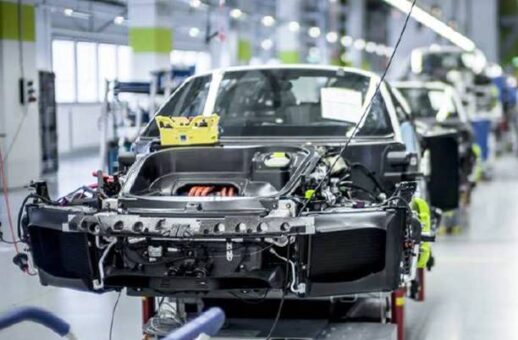ISLAMABAD: The Federal Board of Revenue (FBR) has initiated a number of initiatives to facilitate taxpayers during first half of the current fiscal year 2021/2022 (1HFY22).
According to Mid-Year 2021/2022 progress report issued by the ministry of finance, the revenue agency had done its best to facilitate the taxpayers in order to create congenial environment and to fetch sufficient tax revenues.
The ministry highlighted the initiatives taken in the Inland Revenue such as:
READ MORE: Tax incentive granted for revival of sick industrial units
Track and Trace System:
Track and Trace Solution has been rolled out for tobacco and sugar sectors and its rolling out for cement, beverages and fertilizer sectors in progress. The system is aimed at enhancing tax revenue, reducing counterfeiting and preventing smuggling of illicit goods through implementation of a robust, nationwide, electronic monitoring system through the affixation of tax stamps on various products at the production stage. This enables FBR to trace the entire suppy chain of manufactured goods.
Point of Sales (POS):
Point of Sales (POS) Invoicing System is a pathway towards digitization. Responding to the growing needs of digitization of economic transactions in Pakistan, FBR has launched POS invoicing, which is computerized system for recording sales data, managing inventory and maintaining customer data. It is a real-time sales documentation system that links the electronic systems at the outlets of all Tier-1 retailers with the FBR via the internet. The system is aimed to ensure that all sales are reported in real-time to the FBR and are duly accounted for in monthly sales tax returns of such retailers.
READ MORE: FBR explains tax amnesty on equity investment
Automated Issuance of refunds:
To facilitate taxpayers, centralized automated refund system has been introduced with no requirement for manual application and verification. The system-based verification system issues refund directly into the bank accounts of taxpayers without any requirement with face-to-face interaction with tax authorities. Enabling legal framework has also been provided through insertion of relevant provisions in tax laws.
Single Sales Tax Portal/Return:
Building further on its vision to facilitate taxpayers and ensure ease of doing business through automation, digitization and minimization of human interaction with taxpayer, the FBR has launched Single Sales Tax Portal. Under this new portal the sales tax returns of December 2021 were filed in January 2022. This facility will enable taxpayers to file single monthly sales tax returns instead of multiple returns on different portals; thereby, significantly reducing the time and cost of compliance. The system will automatically apportion input tax adjustment as well as tax payments across the sales tax authorities, therefore, eliminating the needs for reconciliation and payment transfers.
READ MORE: Input tax adjustment restricted for oil, ghee, steel makers
E-hearing:
In order to provide faceless tax administration, reducing compliance cost and saving precious time of taxpayers, the mechanism of e-hearing has been devised. Enabling legal provisions for admissibility of evidence collected during e-hearing has been introduced through 227E of Income Tax Ordinance, 2001.
E-filing of appeal:
The mechanism of online filing of appeals has been made available to taxpayers. However, enabling legal provisions were lacking which have been introduced through Section 127 of the Income Tax Ordinance, 2001.
Tax Asaan:
A mobile application to facilitate taxpayers, available free of cost for Android as well as iOS based smart phones. It offers various facilities to the taxpayers including registration for income tax and sales tax, return filing for salaried individuals and POS invoice verification.
IREN and Joint Anti-Smuggling field intelligence exercise:
Establishment of Inland Revenue Enforcement Network (IRWN) to check smuggling and counterfeit products. Inland Revenue Service and Pakistan Customs Service have joined hands for anti-smuggling filed intelligence exercise.
READ MORE: FBR detects fraudulent declaration of goods in ST returns
Risk based Audit:
FBR has developed a centralized risk based audit management system (RAMS) for selection of audit cases centrally on the basis of pre-determined risk parameters. Selection of scientific matrix allowing allocation and distribution of weightage to different parameters in risk grid will segregate the potential and high-risk cases for audit through parametric computer balloting. Subsequently, in September 2020, through Audit Policy 2019, a total number of 12,533 cases were selected for audit for tax year 2018 through RAMS.
Measures taken in Customs to facilitate trade during Mid-year:
Pakistan Single Window (PSW):
The system of Pakistan Single Window (PSW) has been launched to achieve trade facilitation in an automated environment, reduce clearance times for legitimate trade, improved compliance through increased access to regulatory information and functions. It ensures greater collaboration and coordination between customs and other border regulatory agencies at the national and international level for coordinated border management and enhanced transparency in regulatory processes and decision-making.
Automated Process for Scanning of Cargo:
The Pakistan Customs Wing has introduced a new automated process for scanning of containerized import consignment of industrial raw materials for their speedy clearance at ports. WeBOC has led to significant reduction in processing time. The introduction of non-intrusive inspection system by customs was a long-awaited initiative aimed at replacing physical inspection of cargo and reducing the dwell time at ports by using the latest scanning technology in line with international best practices.
Virtual Assessment Module:
This is a system based automated assessment of goods declared (GD) on the basis of selectivity criteria. The module has been developed and deployed. It will significantly facilitate the assessment process of GD by reducing the clearance time.
Development of Authorized Economic Operator (AEO) Module:
The AEO Module has been developed and deployed. It will help in reducing in port dwell time and customs clearance.
Threshold for Electric/Digital Mode of Payment:
The Threshold for electric/digital mode of payment has been lowered from Rs500,000 to Rs200,000. The module has been developed and deployed. It will streamline the payment process and would reduce time.
Common Bonded Warehousing Module:
The module has been developed and deployed. It will help in streamlining the matters relating to common bonded warehouse.





